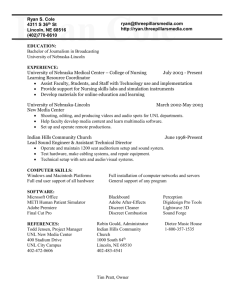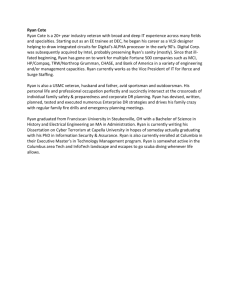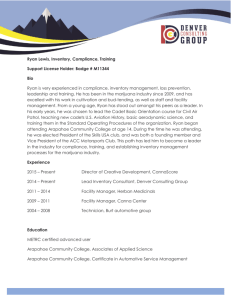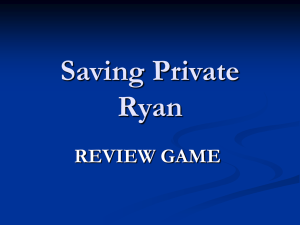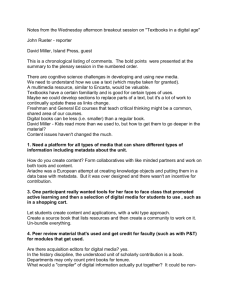Ours is not to reason why
advertisement
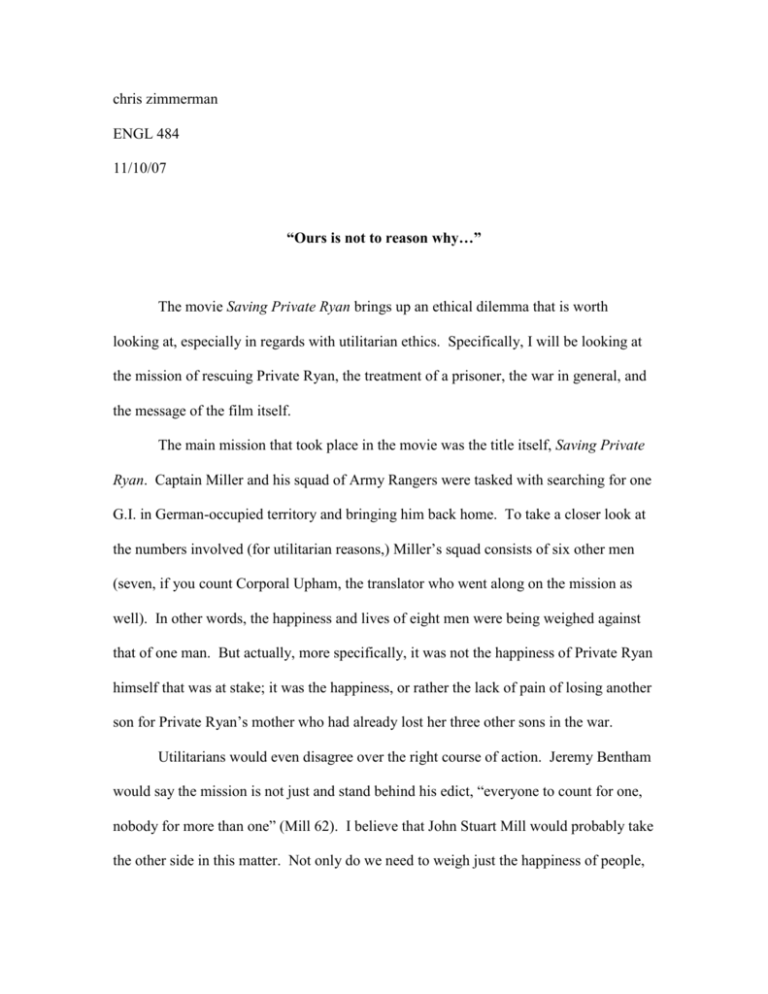
chris zimmerman ENGL 484 11/10/07 “Ours is not to reason why…” The movie Saving Private Ryan brings up an ethical dilemma that is worth looking at, especially in regards with utilitarian ethics. Specifically, I will be looking at the mission of rescuing Private Ryan, the treatment of a prisoner, the war in general, and the message of the film itself. The main mission that took place in the movie was the title itself, Saving Private Ryan. Captain Miller and his squad of Army Rangers were tasked with searching for one G.I. in German-occupied territory and bringing him back home. To take a closer look at the numbers involved (for utilitarian reasons,) Miller’s squad consists of six other men (seven, if you count Corporal Upham, the translator who went along on the mission as well). In other words, the happiness and lives of eight men were being weighed against that of one man. But actually, more specifically, it was not the happiness of Private Ryan himself that was at stake; it was the happiness, or rather the lack of pain of losing another son for Private Ryan’s mother who had already lost her three other sons in the war. Utilitarians would even disagree over the right course of action. Jeremy Bentham would say the mission is not just and stand behind his edict, “everyone to count for one, nobody for more than one” (Mill 62). I believe that John Stuart Mill would probably take the other side in this matter. Not only do we need to weigh just the happiness of people, but we must also consider what pain or unhappiness would be caused. Mrs. Ryan’s unhappiness and pain is on one side of the scale and the unhappiness and pain of the other mothers (and other loved ones) is on the other side. The pain that Mrs. Ryan would feel at losing all of her sons would probably (though how can misery even be measured?) be worse than the possible pain of the mothers of Miller’s squad losing one son each in a worst case scenario. That brings up other questions and other possibilities for scenarios, such as, what if Wade was an only son? What if the mission would have failed in one way or another? It certainly would not have been a stretch. Miller comments to Horvath that finding one particular soldier is like finding “a needle in a stack of needles.” What if Miller and his squad were wiped out and Ryan either made it back home alive or not? Would the mission be just then? I think that possibility is something the Army Chief of Staff should have thought of. There are too many other unknowns to go into more depth with the pondering of other scenarios than that, however, so we can only judge with the knowledge that we have, to the best of our abilities. Throughout most of the mission, the characters talked about the reason for the mission and if it made sense or was just. To most of the soldiers, it came down to a simple number game of eight to one. Reiben sums it up best when he says, “You wanna explain the math of this to me? ...where’s the sense of risking the lives of the eight of us to save one guy?” To them, it was easy math and not worth the risk of the tradeoff. Wade is the only one who disagrees and says, “Think about the poor bastard’s mother.” Wade seems to be the only one that understands (or perhaps “cares” is the right word) that the mission is not about the one soldier, but the mother who has three deceased sons already. Reiben replies to Wade, “Hey, doc, I got a mother, all right? You got a mother. 2 Sarge’s got a mother….” I think Reiben has a good point. If two or three or all eight of them die, what about their mothers and loved ones? A utilitarian like Mill would want to look at and try to balance as much as possible the pain that could be caused to all involved. It is not solely about numbers, but amount and quality of happiness or pain inflicted. During the scene in the church at night, Miller told Horvath, “When you end up killing one of your men, you tell yourself it happened so you could save the lives of two or three or ten others – maybe a hundred others...and that’s how simple it is. That’s how you rationalize making the choice between the mission and the men.” Horvath adds, “Except this time, the mission is the man.” Miller replies, “This Ryan better be worth it. He’d better go home and cure some disease or invent the longer lasting light bulb….” Clearly, Miller doesn’t believe in the mission and he wonders aloud how one man would be worth the risk to his men. He even says that he wouldn’t trade ten Ryans for one Caparzo (the first soldier to die on the mission). Miller and Horvath agree that the risk to the lives of the men in the squad is not justified to save a lone man. Is one man worth it? This is something that Aristotle should address. Is the mission to save Ryan worth it? Is Ryan worth more? Aristotle would have us look at the actors themselves, since that is where we decide if someone is virtuous or not. We should look at the soldiers sent to rescue Ryan first. Captain Miller leads the squad. He is a brave man, a capable leader with a captain’s rank (probably not a good tradeoff for a private,) and he is also a teacher (obviously a valuable person to the community). Wade is a skilled medic who could save an unknown number of lives in the war and after it. Sergeant Horvath is a cunning veteran and has been fighting in the war for at least a year 3 or two. He clearly has valuable knowledge to share with the squad that helps them to keep their lives intact. Jackson is a superb marksman and a superior soldier. All we know about Ryan is that he is in the 101st Airborne, so he is a skilled soldier, but he only holds a private’s rank. He may even be a crack addict and a rapist for all we know. Aristotle would think that the mission to save Ryan is a foolish one and his quality as a person is not greater than that of the other soldiers. As Jackson himself phrased it, “This entire mission is a serious misallocation of valuable military resources.” Others did not agree and held the same view as Wade. Obviously the Army Chief of Staff felt the mission was a good one since it was his idea in the first place. Further down the command ladder, Captain Hamill, when talking with Captain Miller, said, “…I understand what you’re doing…I have a couple of brothers myself…Find him. Get him home.” Interestingly enough, even Private Ryan does not believe in the mission. When Miller’s squad found Private Ryan, he did not want to leave his fellow soldiers at the bridge to their fate. When Ryan refused to leave, Captain Miller asked if that’s what they were going to have to tell his mother. Ryan then said, “Tell her…I was with the only brothers I have left and that there’s no way I would desert them.” Private Ryan thinks that the ethical dilemma is about him (and also the happiness/lives of his comrades) and not his mother. Also, at this point in the movie is when Sgt. Horvath seems to have a change of heart about the mission. While talking with Miller about what they were going to do about Ryan’s refusal to leave, Horvath says, “…someday we may look back on this and decide that saving Private Ryan was the one decent thing we were able to pull out of 4 this whole god-awful, shitty mess.” I find it interesting that he calls it “the one decent thing” as though he accepts that the mission’s intention is a good one. I find it interesting that even though Miller and most of the squad don’t agree in the mission, they follow orders and do their duty anyways. Duty is the main concern of Captain Miller. As they are planning to attack a machine gun nest by the broken radar tower, Mellish says, “…we can skip it and still accomplish our mission” (meaning they would simply go around the machine gun nest). Miller, conscious of his duty of the mission, but not overlooking his duty (more in a Kantian sense than a military sense) to protect the lives of fellow soldiers, says, “…just leave it here so it can ambush the next company that comes along?” Mellish replies, “It seems like an unnecessary risk, given our objectives.” This is truly ironic since the mission to save Ryan may be seen as an unnecessary risk. In fact, Miller responds to Mellish by saying “Our objective is to win the war.” Another moment in the movie that is an ethical dilemma is when Miller’s squad was trying to decide if they should kill their German prisoner, who is known as Steamboat Willie. The savvy Reiben was quick to point out that the prisoner would just get picked up by the Wehrmacht and put back into service. Upham took the other side and said that letting Willie live is “the right thing to do.” After watching the rest of the movie and seeing what happens, a consequentialist would say that Reiben was right and it was a bad idea to spare Willie or just to let him go. Steamboat Willie shot Miller plus who knows how many other soldiers. Strangely enough, by having the incredibly unlikely event that one particular soldier would reappear later and kill the main character 5 of Saving Private Ryan, it appears that the text seems to show that sparing the life of a German prisoner is a bad thing. To a universalist like Kant, killing Steamboat Willie is absolutely wrong since it is always wrong for anyone to kill anyone else. That line of thought brings up the question, “Is killing in World War II justified?” Obviously, Kant would say, “No, killing is never justified.” A consequentialist like Mill would say that in certain circumstances, such as saving lives, it is a duty to act unjustly, but such an act would not be a virtuous act (Mill 63-64). In World War II, especially this would come into consideration since the Allies were opposing the Nazis and their genocide programs against the Jews. The happiness and lives of the Jewish race living within the reach of Hitler, not to mention all the targets of the Third Reich, were all at stake. Doing unjust acts such as killing would be a duty then if it opposed the Nazis and Hitler. However, I must say that at times in the filmic text, it goes beyond more than just a duty. It seems to be a good or just action to kill Germans. Mill would point out that it would be a duty to fight and kill the Nazis if need be, but certainly not a virtuous act. The text of the film itself does not fully weigh in on one side or the other on if the mission was justified. Most of Miller’s squad was opposed to the mission to risk all of their lives for one man (their dialogue speaks volumes). However, the final scene with the pathos-laden argument of the large family of a now-old Ryan seems to point to how the text ultimately feels about the mission. But what about the cost? When all was said and done, the only survivors were Ryan, Reiben, and Upham. Among the dead were Miller, Horvath, Jackson, Wade, Mellish, and Caparzo – six dead to save one. Mathematically, it was not a good trade. Aristotle certainly would not trade “better” men 6 like Miller and Wade for Ryan. However, I must point out that if Miller’s squad arrived at Ramelle at the right time and were successful in holding the bridge and denying it to the Germans, thus furthering the Allied cause and hindering the Axis and Hitler. However, there is no way anyone knew how that would play into the mix before the mission to save Private Ryan was underway. It is more of a plot device than anything that should weigh into the ethical debate. Saving Private Ryan justifies the mission to save one man and is a bit too generous about praising the killing of Germans, especially in the way they show how mercy towards a German prisoner came back and got Miller and others killed. I could see it as a duty to resist the Axis in any way, but not a good deed to kill people, especially a defenseless prisoner. Personally, I must disagree with the text in that sense and also say that the mission was FUBAR, except for its good intentions. The real thought should have been put into the bigger picture as to how Miller and his squad could better be used to fight the war and save more lives in the end since the fate of the entire world, everyone’s happiness and pain was at stake. I believe that Bentham, Mill, and Aristotle would agree with me as well, so at least I am in good company. 7 Works Cited Mill, John Stuart. Utilitarianism. Indianapolis: Hackett Publishing Company, Inc. 2001. Saving Private Ryan. Dir. Steven Spielberg. DVD. Dreamworks: 1998. 8

